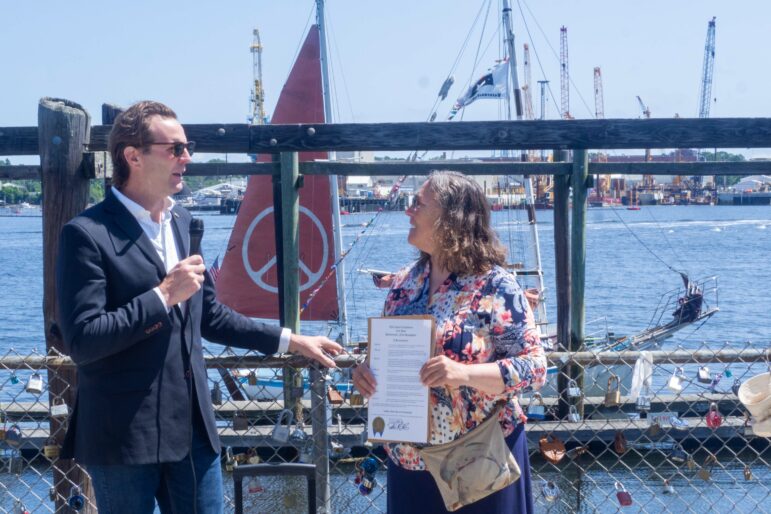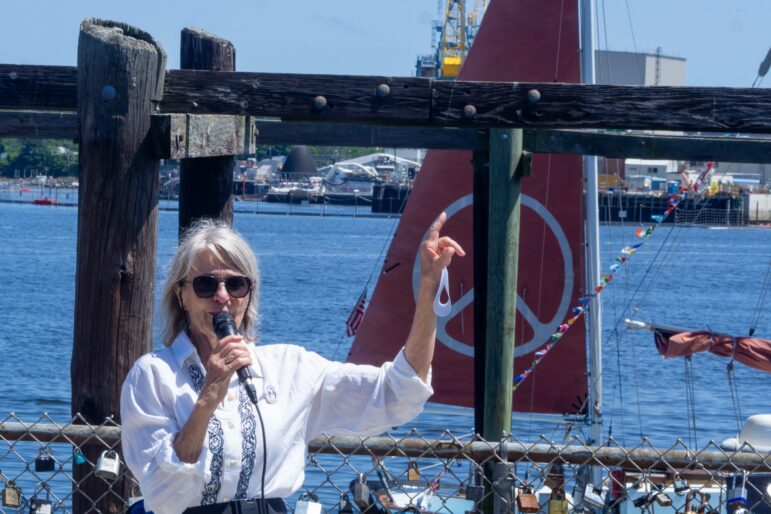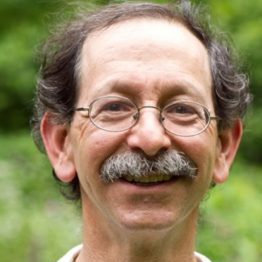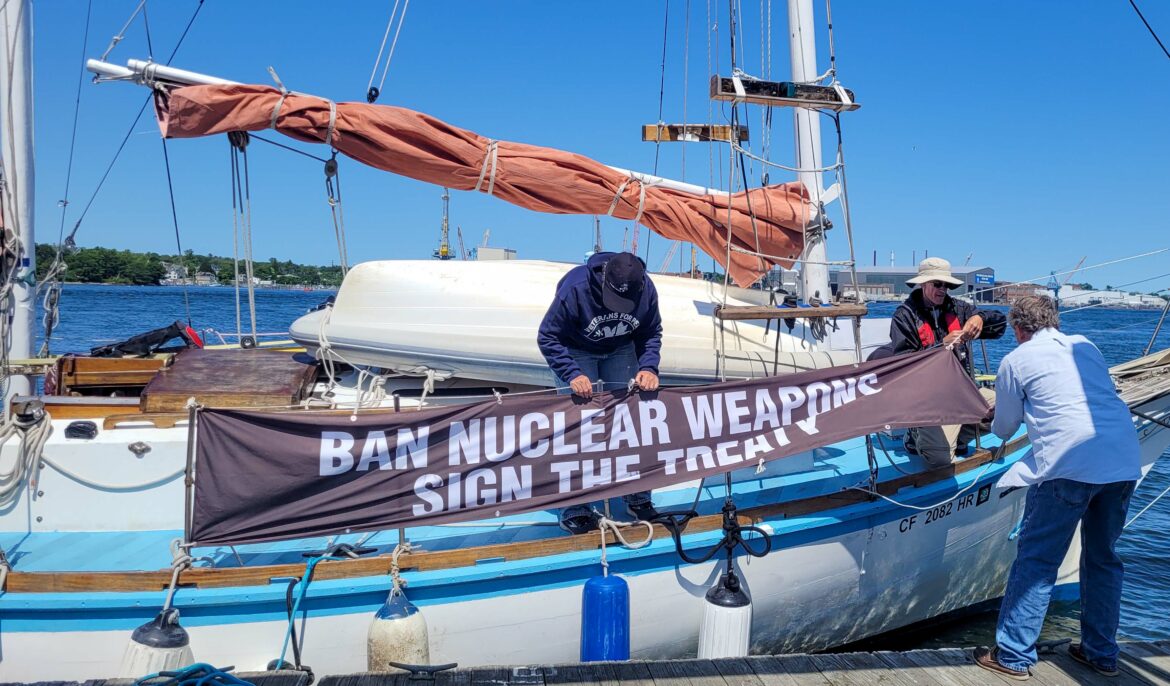


Arnie Alpert spent decades as a community organizer/educator in NH movements for social justice and peace. Officially retired since 2020, he keeps his hands (and feet) in the activist world while writing about past and present social movements.
By Arnie Alpert, Active with the Activists
PORTSMOUTH—The Golden Rule, a 30-foot sailboat, reached the Piscataqua River in the early afternoon on Wednesday, June 21, and motored past the Portsmouth Naval Shipyard to a wooden dock at Portsmouth’s Prescott Park.
After the four-person crew secured the boat, the first thing they did was attach a banner that proclaimed, “Ban Nuclear Weapons. Sign the Treaty.”
Golden Rule is not on its first mission. The boat first sailed in 1958 in an attempt to reach the Marshall Islands, where the United States was testing nuclear weapons. The mission’s organizers, Quaker pacifists, had been public about their intent. “We write to tell you of our intended action regarding the announced spring test explosions of American nuclear weapons,” they wrote to President Dwight Eisenhower. “Four of us,” the letter continued, “with the support of many others plan to sail a small vessel into the designated area in the Pacific by April 1. We intend, come what may, to remain there during the test period in an effort to halt what we feel is the monstrous delinquency of our government in continuing actions which threaten the wellbeing of all men.” The arrests of crew members as they sailed from Honolulu sparked the growth of a movement against atmospheric testing of nuclear weapons, leading several years later to a treaty which made such tests illegal.
Now, activists concerned about the threat that nuclear weapons still pose want the United States and other nuclear powers to get behind the Treaty on the Prohibition of Nuclear Weapons, which entered into force on January 22, 2021 without the support of any of the nine known nuclear powers.
When the 1958 Golden Rule voyage ended, its anti-nuclear owners put the boat up for sale to cover their expenses. The boat sailed off into obscurity until members of Veterans For Peace found its wreck in a northern California shipyard in 2010. The organization’s members decided to get the vessel shipshape and put it back on the water. That took five years, but since 2015, Golden Rule has been to dozens of ports, where volunteer crew members and local host groups have raised the alarm about nuclear weapons and the treaty which makes them illegal.
The ship’s Portsmouth visit was planned by members of Seacoast Peace Response, NH Peace Action, Veterans for Peace, Dover Friends Meeting, Seacoast Anti-Pollution League, Community Church of Durham, and the Portsmouth Democrats. Committed to the cause of reducing nuclear risks, they worked for weeks on the practical details: reserving a “parking place” on the Prescott Park dock, organizing potlucks, and spreading the word.
Already, nine New Hampshire communities, including Portsmouth, have adopted Town Meeting or City Council “Back from the Brink” resolutions calling for specific steps to reduce nuclear threats, including adoption of the treaty which declares nuclear weapons to be illegal. They hope the ship’s visibility will help them find people to introduce similar resolutions in more communities and create what Jeremy Love of the Back from the Brink Campaign called “a drumbeat of consistent anti-nuclear activism.” The United States spends $83,000 every minute on nuclear weapons, Love said. “Imagine how we could appropriate that money elsewise.” Portsmouth’s mayor, Deaglan MacEachern, gave the boat and its crew an official welcome on Thursday morning. “It was a no brainer to come support a world without nuclear weapons, to move away from the brink, especially now, as we see some of the old hostilities growing,” he said before reading a proclamation which called the Golden Rule “a sailing ambassador for the message of ending the threat of nuclear war” and declaring the day to be “Golden Rule Day” in the port city.
Golden Rule’s crew has been a rotating cast of volunteers since its re-launch in 2015. For Steve Baggarly, it was a “no brainer” to host the Golden Rule when it visited Norfolk, Virginia, where he lives, and to get on board as a crew member for the voyage in New Bedford, Massachusetts, near the town where he was born.
Baggarly’s commitment to ending the nuclear threat knows few limits. As a college student in North Carolina, he and the woman he would later marry studied the examples of Mahatma Gandhi and Martin Luther King, Jr. and concluded, “The way that that they resisted evil, nonviolently but relentlessly, was what Jesus was talking about. It really opened our eyes. The key to the gospel is to understand nonviolence as what Jesus was, what he was about, what he was teaching, what he was doing.” After college, they joined the Catholic Worker, a pacifist movement begun by Dorothy Day and Peter Maurin in 1933, and opened the Sadako Sasaki House of Hospitality in Norfolk in 1989.
Since then, he has combined running a soup kitchen with activism on a range of issues, but always with nuclear weapons in mind. Led by faith, he joined the Plowshares movement, which believes in literal application of the biblical dictum to beat weapons into plowshares.
On Ash Wednesday in 1997, Baggarly and five others carried hammers onto a nuclear-capable Aegis destroyer under construction in Bath, Maine, where they beat on the ship and poured their own blood as an act of protest and resistance. For that, Baggarly spent a year behind bars, much of it sharing a cell with Phil Berrigan. The experience, he said, helped him prepare to live in the confined space of a small sailboat with three other people.
Zoe Byrd, another crew member, also has years of experience in the movement against nuclear weapons, starting when her older brother was arrested protesting at a nuclear submarine base in Bangor, Washington in the early 1980s. After finishing high school, Byrd began participating in peace walks, once walking halfway across the country. “I love a project that moves, that travels,” she said.
Like Baggarly, Byrd has been arrested multiple times at anti-nuclear protests, including at the Nevada Test Site, where two of the original Golden Rule crew members had been arrested in 1957. She heard about the Golden Rule project from her brother and met up with it at a wooden boat festival in Port Townsend WA in 2017. When the project created a 29-minute documentary video, she took it on the road and showed it in Northern California, Oregon, and Washington. She also traveled with the ship to Cuba and joined the crew when it sat out the Covid pandemic in Hawaii, where she did additional public speaking, including in high schools.
How to reach the younger generation is on the mind of people involved in the Golden Rule project. Bill Good, a middle school science teacher from Lancaster, Ohio, sails his own boat on Lake Erie and currently serves as first mate on Golden Rule. Now in his late 50s, Good observed that his students, two generations removed from the Cold War, don’t have the memories of nuclear threats which had schoolchildren sheltering under their desks in civil defense drills. They don’t live with the nuclear fears that were daily realities for his and their grandparents’ generation. Young people, he said, are aware of the threat from climate change, but “nuclear weapons and nuclear annihilation doesn’t come up.”
“These weapons are still here. They’re still a threat to life on our planet,” he said. Good joined the crew in New York City the day after school let out for the summer.
“Every country that has nukes, all nine of them, they’re all modernizing and building new nukes, starting to build new nukes, modernizing all their weaponry and forces and warheads. We’re doing it to the tune of $2 trillion,” Steve Baggarly observed.
“There’s also the Ukraine war and there’s saber rattling with China and North Korea. And it’s as The Bulletin of the Atomic Scientists says, we’re at the most dangerous time now since the Cuban Missile Crisis,” he added. “So, it’s a great time to be on the boat.”
Like Bill Good, Debbie Weeks, the ship’s captain, is an educator. A descendant of the New Hampshire Weeks family, she lived in Portland, Maine growing up and returned to northern New England to teach at Maine Maritime after getting a PhD in chemistry. After a particularly frigid winter she decided to head south, far south. “I landed a job in Hawaii,” she said, and decided to travel there by sail. “I had a boat in California from when I was there in graduate school, fixed her up and sailed her to Hawaii, single handed.”
Since then, Captain Debbie, as she is known, has gone back and forth between teaching and private industry, including a stint at an aluminum factory in Australia. She also served as Director of Disaster Services on the island of Hawaii, including during the 2018 incident when a false alarm was issued that a ballistic missile was headed their way. (If you want to prep, she advised, get enough food for 2 weeks and plan to stay indoors to avoid exposure to fallout in the event of a nuclear blast.)
Weeks said that in Hawaii she knows plenty of Pacific Islanders whose families were directly affected by nuclear weapons testing in the 1950s. When she heard about the Golden Rule from a sailing friend, she realized she could take the summer off and spend it raising visibility about nuclear dangers and spreading a message of peace.
“And that’s what this boat is doing, spreading the message of peace. That’s our big peace sign on our mizzenmast sail. And I’m here because I love to sail. And I love old wooden boats, and I love New England,” she said.
The Golden Rule will be docked at Prescott Park through Sunday morning, when it will embark for Portland and Bath, the easternmost port on its “Great Loop Tour” around the eastern United States. From Bath, it will sail back to New York, where it will head up the Hudson to the Erie Canal and the Great Lakes. They expect to reach Chicago shortly after Labor Day.
Saturday evening, the local host committee will sponsor a public event in the parish hall at South Church, where members of the public can hear from the crew as well as from Dr. Ira Helfand from the Nobel Peace Prize-winning International Physicians for the Prevention of Nuclear War and Steve Curwood from the Dover Friends Meeting. For the crew and the committee members, it’s one more way to reach people about the issues and spur them to take action.
The treaty and the Golden Rule present a great opportunity, Steve Baggarly said. “It’s a great icon to have something physical that people can come to and see and touch and say, wow, this actual boat, though it didn’t make it to the Marshall Islands, it made a huge impact on the global push to end atmospheric testing. It’s a great story.”
Baggarly would like to see January 22, the date the Treaty on the Prohibition of Nuclear Weapons entered into force, become a day for commemorative events. “We’ve been working against nuclear weapons for 35, 36 plus years,” he said, “and always working against them. But with the Treaty on the Prohibition of Nuclear Weapons, we have something to work for.”






